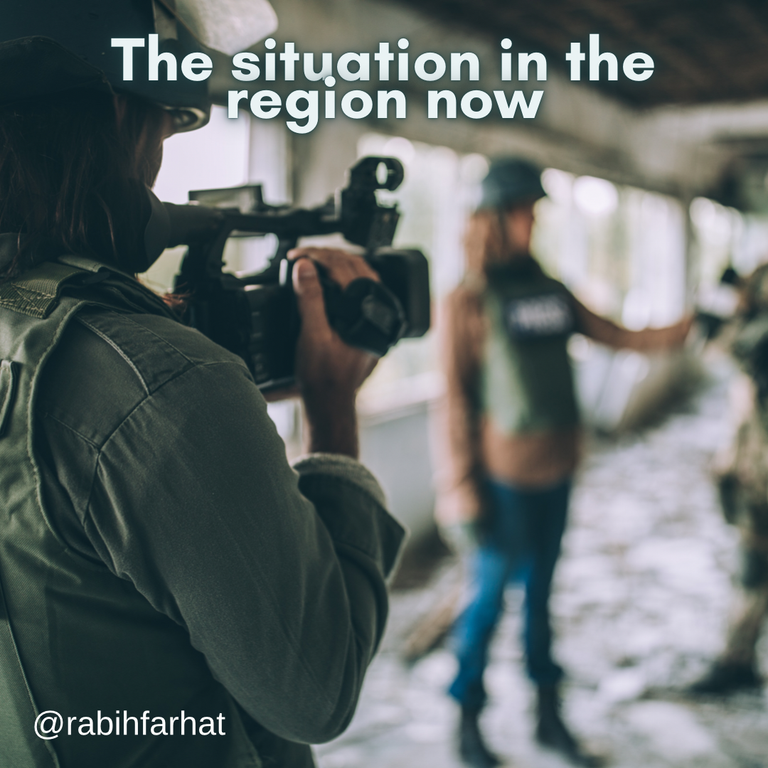Introduction
I do not know what the situation will be in the Middle East from now on, but what I do know is the intensification of the war in Gaza, the combustion on the Lebanese-Israeli front, and the general anxiety on all other fronts in the West Bank, Syria and Iraq.
But the greatest fear globally, regionally and locally in every country concerned is whether the regional war will break out with an attack by Iran and its affiliates in the region in response to the assassination of the head of the political bureau of the "Hamas" organization in the heart of Tehran, in addition to the assassination of the military commander of the "Hezbollah" organization, In the southern suburb of Beirut.

The analogy was made with the assassination of another Iranian military leader in the Iranian consulate building in Damascus. At that time, Iran was determined to take revenge and launched a major attack on Israel without any casualties or injuries. Israel responded by launching a counterattack that did not shed a drop of blood. Iran then declares that the confrontation process has ended at this point. The battle ended at this point, and repeating the experiment is of no benefit or interest.
All that has become known and can be concluded is that Israel carried out the assassinations in order to provoke Iran and its affiliates to take widespread revenge and obtain an opportunity to destroy its nuclear weapons, as it did in Syria and Iraq before.
But the United States, which is experiencing a pivotal electoral moment, found it approaching the crisis with a massive military buildup and firepower that would block the face of the sun in a state of explicit threat, if Iran launched an attack on Israel, supported by the allies Britain, Germany, France, and Italy. In parallel with the threat, the temptation to launch a major diplomatic attack to support the mediators Egypt and Qatar in resuming ceasefire negotiations and exchanging prisoners and detainees in a truce deal was enough to tempt Iran to stop the confrontation at this point.
What happened after that is unknown, but thinking about what the Palestinian-Israeli crisis will end up with after the destruction and killing and putting the entire region on the brink of abyss has become necessary for the safety of the countries and peoples of the region. What is common about this thinking is research into what is called “the next day,” which is about perceptions or possible solutions regarding Palestine and Israel, as well as Arab and American.
But thinking again makes it seem unthinkable that whatever arrangements the war will end after the current crisis, there is no escape from the root of the problem, which is that the Palestinian and Israeli sides are suffering from a crisis within the political structure in both of them related to the relationship between politics and weapons, or Political power and its sole monopoly on the legitimacy of the use of armed force.
This matter has been discussed before with regard to the Palestinians, as there are dozens of armed Palestinian organizations that use weapons to make war and peace decisions without legitimacy. But now the same issue exists in Israel, where the same thing is happening, and a number of analysts say that Israel is heading down an illiberal, violent and destructive path.
Unless there is a change in the ideas upon which it was founded - for the Jews, the state will face a dark fate. The state is increasingly taking the path of authoritarianism not only in dealing with the Palestinians but also with its citizens. It loses its friends in the world and becomes isolated, and from the inside it will be torn and split.
Conclusion
The Israeli knot that takes it towards the civil war begins with “the end of Zionism, where “Zionism” means the national state of Israel to be replaced by Jewish religious state based on fanaticism and extremism toward its citizens, whether Arabs, Jews, or foreigners. The Israeli electoral system allowed the infiltration of religious sects into the Knesset and from there into Israeli governments, which impose their values that exempt them from conscription.
The most dangerous thing is to control weapons and distribute them to settlers and settlements in the West Bank and Jerusalem, with the right to make decisions about their use in the West Bank and Gaza Strip. Moreover, the government has begun to use its military power even against the Israeli army itself.
In short, Israel has become deprived of the most important conditions for a state, which is the legitimate monopoly on the use of weapons. The solution, in the analysts view, requires deep constitutional reforms that are likely to be exposed to armed confrontation by religious parties.
*Image designed using Canva
Posted Using InLeo Alpha